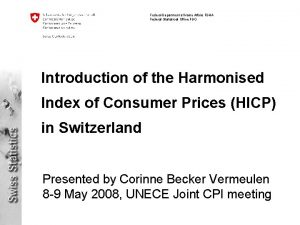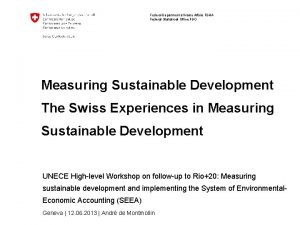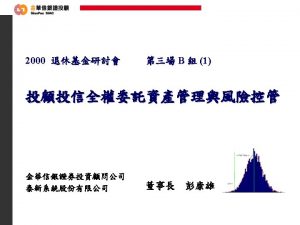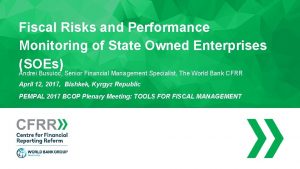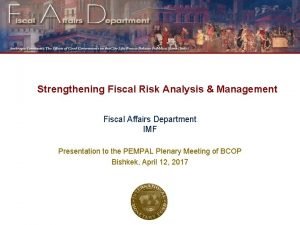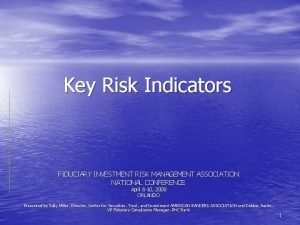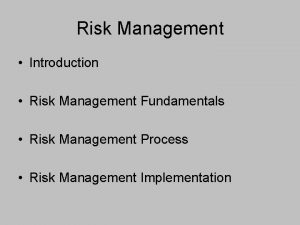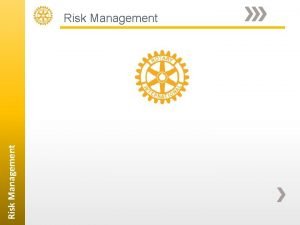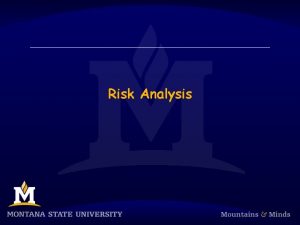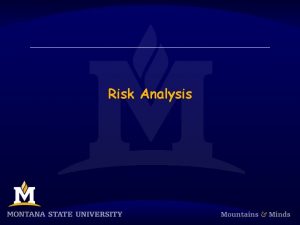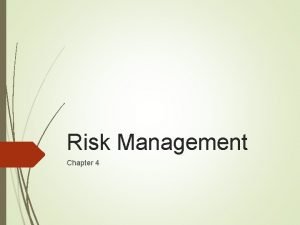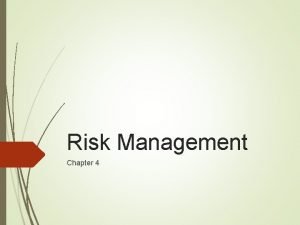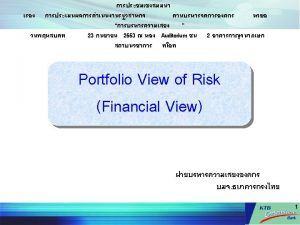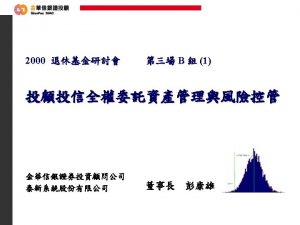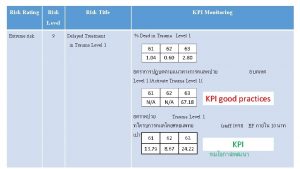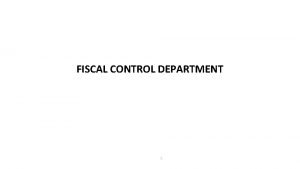Strengthening Fiscal Risk Analysis Management Fiscal Affairs Department



















- Slides: 19

Strengthening Fiscal Risk Analysis & Management Fiscal Affairs Department IMF Presentation to the PEMPAL Plenary Meeting of BCOP Bishkek, April 12, 2017

I. Outline of Presentation I. Why Fiscal Risks Matter II. Characteristics of Fiscal Risks III. Understanding Fiscal Risks IV. Fiscal Risks Management

I. Sources of Fiscal Risks • Definition: The possibility of fiscal outcomes deviating from expectations (budget forecasts) • Risks arise from: – Macroeconomic shocks (General fiscal risks) – Realization of contingent liabilities (Specific fiscal risks) • Explicit contingent liabilities (e. g. calls on guarantees, legal claims) • Implicit contingent liabilities (e. g. banking crisis) – Institutional weaknesses – that constrain the effectiveness of fiscal risk management

I. Sources of Fiscal Risks Sources of Unexpected Increase in General Government Debt (percent of GDP, 2007 -2010) DEU NLD ESP PRT GBR USA GRC IRL 1. 7 3. 2 -2. 4 1. 8 11. 3 3. 7 8. 1 16. 3 10. 9 6. 0 1. 7 1. 8 -0. 9 -0. 1 1. 5 7. 1 2. 5 1. 6 4. 0 4. 7 -0. 7 1. 4 -0. 2 0. 6 9. 4 1. 9 0. 9 11. 2 -0. 1 2. 5 1. 1 So. Es & PPPs 0. 7 0. 0 -1. 3 1. 7 0. 3 0. 0 2. 6 -0. 2 4. 5 0. 2 Arrears 8. 4 12. 8 14. 2 15. 4 8. 1 17. 0 6. 3 40. 0 60. 2 39. 5 9. 8 Macroeconomic shocks 8. 3 4. 7 5. 2 13. 0 4. 4 8. 9 3. 8 38. 4 35. 7 -3. 3 6. 0 Financial sector interventions 0. 0 8. 1 9. 0 2. 5 3. 6 8. 1 2. 5 1. 6 24. 5 42. 8 3. 8 Contingent Liabilities Policy changes 2. 3 3. 8 1. 9 4. 7 1. 1 6. 4 -8. 0 -9. 9 -4. 3 4. 7 Stimulus / Consolidation Other factors 2. 1 -0. 3 6. 5 1. 9 3. 7 6. 2 8. 3 -6. 7 7. 5 21. 6 5. 9 14. 4 19. 5 20. 2 24. 0 27. 8 28. 0 29. 1 41. 7 59. 1 67. 7 26. 4 Underlying fiscal position Revisions to 2007 deficit & debt Changes to government boundary Cash-accrual adjustments Exogenous shocks Total Unforecast Increase in Debt * GDP-weighted average ISL AVE* Issues Revealed by the Crisis FRA Unreported Deficits Macroeconomic Risks 4

I. Fiscal costs of contingent liability realizations Distribution of Gross Fiscal Costs of CL realizations (% of GDP) 230 episodes, 174 episodes of which with identified fiscal cost Average fiscal cost 6. 1% of GDP Source: IMF staff calculations. 5

II. Characteristics of Fiscal Risks Fiscal risks are large (and surprisingly frequent) Probability of occurrence (percent) Size and likelihood of fiscal shocks by type 10 8 Macroeconomic 6 4 Financial Sector Natural Disaster 2 SOEs Corporate PPPs 0 0 Legal claims Subnational 2 4 6 8 10 12 Average fiscal cost (percent of GDP) Source: Bova et al. (2016) 4

II. Characteristics of Fiscal Risks Fiscal risks are biased toward the downside Forecast Error for General Government Debt in Y+3 (2000 -13 average as % of GDP, actual-forecast) Source: European Commission 4

II. Characteristics of Fiscal Risks are Highly Correlated Contingent liability realizations are correlated with GDP shocks and with each other…. GDP and CL Realizations vs Increase in Debt Avgerage CL Realization Avg. increase in Debt/GDP 0 5 10 15 20 Source: Bova, E. , M. Ruiz-Arranz, F. Toscani, and H. E. Ture, 2016, “The Fiscal Costs of Contingent Liabilities: A New Dataset, ” IMF Working Paper 16/14 (Washington: International Monetary Fund). 5

III. Understanding Fiscal Risks Fiscal Transparency Code Risk Disclosure & Analysis • Macroeconomic Risks • Specific Fiscal Risks • Long-Term Sustainability Risk Management • Budgetary Contingencies • Asset and Liability Management • Guarantees, PPPs and Financial Sector • Natural Resources and Environmental Fiscal Coordination • Sub-National Governments • Public Corporations

III. Understanding Fiscal Risks Risk Matrix

III. Understanding Fiscal Risks Disclosure of risks remains qualitative Contingent Liabilities All LIDCs EMMIEs AEs 0% 20% 40% 60% 80% 100% Percent of countries Quantitative Analysis of Risk Source: IMF Staff Estimates Qualitative Discussion of Risk No Disclosure 7

III. Understanding Fiscal Risks Analysis of fiscal risks is limited Macro-fiscal Risk Analysis (percent of countries) Long-term Sustainability Analysis (percent of countries)

III. Understanding Fiscal Risks More Integrated Approach to Fiscal Risk Analysis • Fiscal Stress Testing can be used to test the resilience of public balance sheets • Features of stress test: – Focus on more extreme events; rather than year-toyear volatility – Explore a range of correlated shocks in an integrated way – Combine macroeconomic shocks with contingent liability realization – Analyze impact on future flows, assets and liabilities (including valuation changes)

III. Understanding Fiscal Risks IMF’s fiscal stress test: fiscal balance and debt shocks Peru Illustrative Stress Test Fiscal Balance Public Debt (Percent of GDP) 4 80 2 Baseline Stress (macro + CL) 70 0 60 -2 50 Macro only -4 Macro only 40 -6 30 Stress (macro + CL) -8 -10 20 -12 -14 Baseline 10 2005 2010 2015 2020 Source: IMF (2016) “Analyzing and Managing Fiscal Risks – Best Practices, ” IMF Policy Paper, June (Washington: International Monetary Fund). 9

III. Understanding Fiscal Risks IMF’s fiscal stress test: liquidity and fiscal burden Peru Illustrative Stress Test Gross Financing Fiscal Burden: Interest (Percent of GDP) (Percent of Revenue) 16 14 16 Baseline 14 Stress 12 12 10 10 8 8 6 6 4 4 2 2 0 0 2014 2016 2018 2020 Stress Baseline 2005 2010 2015 2020 Source: IMF (2016) “Analyzing and Managing Fiscal Risks – Best Practices, ” IMF Policy Paper, June (Washington: International Monetary Fund). 9

III. Understanding Fiscal Risks IMF’s fiscal stress test: solvency Peru Illustrative Stress Test Long-Run Projections Solvency: Net Financial Worth (Percent of GDP) (Percent of 2017 GDP) 20 35 15 Baseline Primary Exp (RHS) 30 Standard Balance sheet Baseline Stress 10 Liabilities Assets 25 Baseline Revenue (RHS) 5 Deficit - baseline (LHS) 0 Discounted Future Flows Baseline Stress 20 -5 15 Deficit - shock (LHS) -10 Net Worth -15 10 2020 2030 2040 2050 Baseline Stress -1, 000 -750 -500 -250 Source: IMF (2016) “Analyzing and Managing Fiscal Risks – Best Practices, ” IMF Policy Paper, June (Washington: International Monetary Fund). 0 250 500 750 1, 000

IV. Fiscal Risk Management: Fiscal Risk Management Toolkit STEP 1: IDENTIFY AND QUANTIFY • Identify risks • Calculate exposure and likelihood • Weigh costs and benefits of intervention STEP 2: MITIGATE • Cap Exposure • Regulate • Transfer STEP 3: PROVISION • Expense • Budget contingencies • Buffer funds STEP 4: ACCOMMODATE RESIDUAL • Account for in setting fiscal objectives 10

IV. Fiscal Risk Management: Institutional frameworks need Strengthening

THANK YOU FOR YOUR ATTENTION!
 Sfsu dates and deadlines
Sfsu dates and deadlines Lara renew nursing license
Lara renew nursing license Vha directive 1123
Vha directive 1123 Federal department of home affairs fdha
Federal department of home affairs fdha Federal department of home affairs fdha
Federal department of home affairs fdha Federal department of home affairs fdha
Federal department of home affairs fdha Department of commerce and consumer affairs
Department of commerce and consumer affairs Department of local affairs
Department of local affairs Credit risk market risk operational risk
Credit risk market risk operational risk Fiscal risk
Fiscal risk Fiscal risk toolkit
Fiscal risk toolkit Fiduciary investment risk management association
Fiduciary investment risk management association Risk map
Risk map Why did the qing’s self strengthening movement fail?
Why did the qing’s self strengthening movement fail? Ways to start a sentence
Ways to start a sentence Address
Address The relationship between strength and total quantity is
The relationship between strength and total quantity is Grain boundary strengthening
Grain boundary strengthening Strengthening a company's competitive position
Strengthening a company's competitive position Bearing joints carpentry
Bearing joints carpentry




